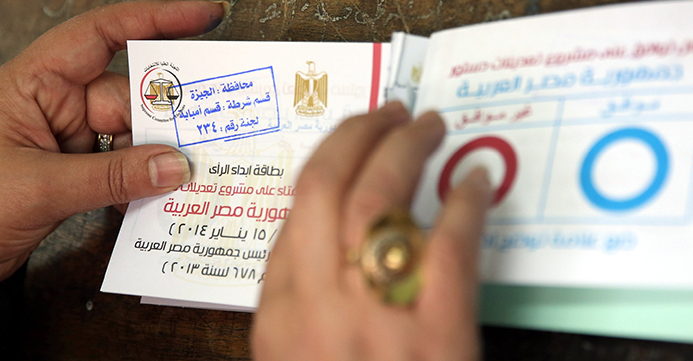The 2012 Constitution was defined as a more liberalist constitution which guarantees democracy, limits the authority of the army though to some extent and brings the state closer to religion. It consisted of 205 articles.
The 2014 Constitution consists of 247 articles 18 of which are related to human rights and freedoms while 45 articles focus farmers and workers.
The authorities of the President were determined in line with the 2012 Constitution. The 2014 Constitution also allows the President to authorize anyone to form a government. The Constitution does not stipulate the formation of a government by the chairman of the majority party in Parliament.
Nevertheless, the 2014 Constitution limits the authorities of the President to appoint the Defense Minister. According to the 2014 Constitution, the Supreme Council of the Armed Forces shall decide the Defense Minister and he shall be appointed for two presidential terms. During this period, the Prime Minister and the President shall not dismiss the Defense Minister.
The new Constitution also limits the authority of the President to abolish the parliament. According to the 2014 Constitution, the President shall not abolish the parliament. The Constitution, however, authorizes the President to put the issue on popular vote upon the parliamentary approval.
According to the 2014 Constitution, becoming a presidential candidate requires approval of 20 members of the parliament or 25 thousand citizens in 15 provinces. The 2012 Constitution, on the other hand, required the approval of 20 parliamentary representatives or 20 thousand citizens in 10 provinces. The Constitution also required at least a thousand approvals in every province. According to the new Constitution, this is valid for 15 provinces. The new Constitution grants broad authorities to the Prime Minister. Therefore, Egypt will be governed by a hybrid system in the upcoming period.
According to the 2014 Constitution, the Egyptian Parliament shall indirectly dismiss the President. The Parliament shall put the early presidential elections to a referendum by two-thirds majority. The referendum requires the permission from the Prime Minister because the two thirds of the deputies in Parliament withdraw their vote of confidence from the President. The 2012 Constitution, however, did not grant such an authority to the members of the Parliament.
THE PRESIDENT SHALL NOT DISMISS THE PRIME MINISTER
The 2012 Constitution included a provision that “authorized the President to appoint and dismiss civil and military personnel.” This provision authorized the President to appoint anyone as Prime Minister and dismiss him at will. According to the 2014 Constitution, however, the President shall dismiss the government only on approval from the parliamentary majority.
The 2014 Constitution abolishes the Shura Council, the upper house of the Egyptian Parliament and grants all authorities to the People’s Assembly. The 2012 Constitution, on the other hand, acknowledged the two parliaments.
CIVIL-MILITARY RELATIONS
The 2014 Constitution grants the Egyptian Armed Forces with a critical authority. The new Constitution stipulates that “the Minister of Defense is appointed on the approval from the Supreme Council of the Armed Forces for eight years.” The members of the Supreme Council of the Armed Forces, i.e. the governing body of the Egyptian army, shall be appointed in consultation between the Minister of Defense and the Commander-in-chief of the Armed Forces. The Constitution does not include any article stipulating who shall dismiss the Minister of Defense. The New Constitution allows trial of civilians in military tribunals. Those committing the crimes that were explained under 14 articles such as “a direct assault against military facilities, barracks or whoever falls under the authority of the military” will stand trial in









